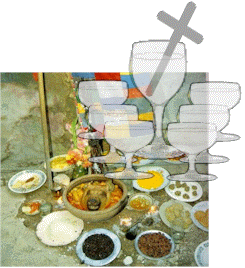 The Syncretism of Egun Worship and Spiritism
The Syncretism of Egun Worship and Spiritism The Syncretism of Egun Worship and Spiritism
The Syncretism of Egun Worship and Spiritismby Shloma Rosenberg
It has long fascinated me that the supposed "syncretism" of Orisha worship and Catholic Saint reverence has received so much attention. When one spends time in the company of much older and/or knowledgeable Orisha priests one finds that the Catholic imagery incorporated into the religion is so far removed from the actual ceremonial practices that it is of negligible importance at best.
What is MUCH more prevalent is the blending of traditional Lukumi Egun worship with European Spiritism (often called Kardecian Spiritism after Allan Kardec-the architect of modern spiritist practice). The two have become so interlinked that it is often hard to distinguish between them.
Indeed, while there are no actual Catholic ceremonies involved in the initiation of a priest, one finds that there are many Oloshas who feel that an initiation will not come out right if a "Misa" (a spiritist mass) is not done prior to the crowning of the Iyawo.
It has become apparent to me over the last few years that this is a relatively recent development. One of my good friends in the religion tells of an elderly Iyalosha who always says, when told of an impending pre-initiation misa: "What misa? If Egun wants something they will say so in the entrada (the pre-initiation divination)!" This is indicative of the attitude of many very old and/or knowledgeable priests.
The syncretism of Spiritism and Egun has become so unbreakable that even so-called "African revisionists", who claim to have taken the New World influence out of Yoruba based traditions, STILL have European spiritual masses as part of their rites. They may take out the Catholic elements (often replacing Kardecian and Catholic prayers with Yoruba), but the structure is still unmistakably Spiritist.
There are even Odu which indicate the need for an individual to pursue development in Spiritist disciplines. This must be taken seriously. If every possibility exists within Odu, then the possibility that an individual should pursue a specific esoteric discipline outside of their usual practices must exist there as well. Conversely, there are Odu which indicate that the spirit world is something for the individual to avoid, and that it would be more propitious to focus on working with Egun exclusively.
In order to properly maintain the structural integrity of the Lukumi tradition, a distinction must be made between Egun worship and Spiritism, as it is not proper to mix one with the other.
Egun worship is the ceremonial honoring and propitiation of one's family dead, whether that family be of blood relation or religious lineage. Lukumi Egun worship involves the offering of food--whether it be blood sacrifice or the offering of actual prepared food--, the chanting of Oro (ritual songs), the playing of drums and other MATERIAL offerings to the Egun.
Egun shrines are located at ground level, either in a remote place inside the house, such as the bathroom or basement, or outside the house (often at the foot of a stand of banana trees). Elements found in a shrine for Egun may be a cane used to summon the dead, often decorated with ribbons and bells, a roof tile on which are painted Odu Ifa which relate to death and the dead, food offerings and, although rarely, a pot or Nishe Osayin which relates to Egun.
Spiritism involves the offering of masses (Sp. misas), seances and white table ceremonies in which mediums offer messages from the spirit world. The spirits who speak may or may not be related to those present.
The most prominent element found within Spiritism is the boveda, a table upon which are placed glasses of water, religious symbols, dolls which represent spirits, incense, cologne, Catholic or Spiritist prayer books, and flowers. The practice of placing food offerings on the boveda is a result of the syncretism of Egun and Spiritism, as only "spiritual" things (incense, cigar smoke, candles, cologne, prayer) are offered to the spirits, and "material" things (food, blood) are offered to Egun.
Whether one chooses to incorporate or abandon Spiritism as a part of their religious practices, one cannot abandon the practice of propitiating Egun. Within the Lukumi religion, it is considered unthinkable to neglect one's family dead. Also, if Odu indicates that it is necessary for an individual to develop within the context of Spiritism, it would be contrary to that person's development to avoid doing so.